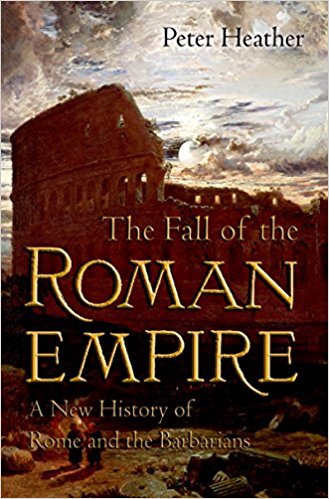
Remember having to memorize all those dates when you were back in school? 1066, 1776, and all that? Right? So, what epochal events do you associate with the years 376, 405, 410, and 476? Give up? No, I’m not going to give you the answers. If you really want them, you can immerse yourself in the pages of Peter Heather‘s The Fall of the Roman Empire. By the time you’re finished — assuming you have the stomach to get through the whole ordeal — you’ll know not only what significance those dates hold but also the names of godknowshowmany inconsequential Roman emperors, generals, and barbarian kings. Frankly, I can’t believe I read the whole thing.
Here, dates and battles and names aside, is the message that British historian Peter Heather was attempting to get across:
- Gibbon got it all wrong. The Roman Empire didn’t fall because of its internal weaknesses.
- What actually happened, according to the latest findings by archaeologists and historians, is that the barbarians ganged up on the Romans.
The Fall of the Roman Empire: A New History of Rome and the Barbarians by Peter Heather (2007) 580 pages ★★★☆☆
OK, it was a little more complicated than that. Around the middle of the 4th Century, the Huns — those nomadic horsemen from the Central Asian steppes — began pushing westward. They didn’t get as far as the Roman frontier, but their relentless drive pushed hordes of Germanic tribes (the original barbarians, from the Roman perspective) further west, and the Germani began crowding the borders that Rome had so carefully kept sparsely populated.
In fact, about 100,000 of them actually managed to cross into Roman territory in the Balkans — and that started the ball rolling. They had permission from the Eastern Roman Emperor in Constantinople — you remember, of course, that the Empire was then divided in two? — but the hapless fellow later had occasion to regret the decision, because the Germani started raising all manner of hell very shortly. (For good reason, too. The Roman generals and provincial officials assigned to their settlement took them to the cleaners.)
For Rome, resistance to the Germanic tribes was a losing proposition
Later, when the Huns, eventually under the gifted leadership of Attila, moved all the way westward toward the Romans’ Rhine frontier in what is now Germany, the Germanic tribes living there decided the time was convenient to actually invade Roman territory, namely Gaul (now France), Spain, and later North Africa. Though Roman generals began hiring Huns as mercenaries to help them fight the other barbarians, and they actually had some success from time to time, it was a losing battle.
Soon enough, Germanic armies managed to sack Rome, not once but twice within the space of a half-dozen years. For several more decades, the Romans tried to pretend nothing had happened while the territory under their control steadily shrank. After all, Rome had ruled the world (well, the Mediterranean, anyway) for nearly half a Millennium, so how could it possibly all end? Eventually, though, before the end of the 5th Century, all the last of the Western Emperors had left was Italy. Being able to read the writing on the wall, he turned out the lamps in Rome and retired to his summer villa.
Why did all this happen? Peter Heather says it was the Romans’ own fault. Their unnecessarily harsh imperial policies drove the Germani to attack them. I would add that Rome had simply bitten off more than it could chew. The Empire had overreached.
Now, why couldn’t he just have said that?
For further reading
You may enjoy browsing through 20 top nonfiction books about history.
If you enjoy reading history in fictional form, check out 20 most enlightening historical novels.
And if you’re looking for a broader view of human history, check out New perspectives on world history.
And you can always find my most popular reviews, and the most recent ones, plus a guide to this whole site, on the Home Page.



























